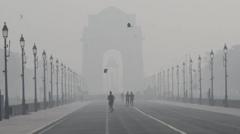Air quality in India’s capital Delhi has deteriorated to severe and extremely poor levels in the past few days, data shows.
Pollution levels crossed 25-30 times the World Health Organization (WHO)’s recommended safe limit at several locations in the city last week.
Experts have warned that the situation will worsen in the coming days due to weather conditions, use of firecrackers during the festival of Diwali on Thursday and burning of crop remains in neighbouring states.
Delhi and several northern Indian cities report extreme levels of air pollution between October and January every year, causing disruption to businesses, shutting down of schools and offices.
The levels of tiny particulate matter (known as PM 2.5), which can enter deep into the lungs and cause a host of diseases, reached as high as 350 micrograms per cubic metre in some areas on Monday, data from government-run Safar website shows.
According to the website, air quality is categorised as very poor when PM 2.5 levels reach 300 to 400, and it’s termed severe when the limit reaches 400-500.
Delhi gets enveloped in a thick blanket of smog every winter due to smoke, dust, low wind speed, vehicular emissions and crop stubble burning.
In November and December, farmers in the neighbouring states of Punjab and Haryana burn crop stubble to clear their fields.
Farming groups say they need financial and technical help to find alternative ways of clearing crop remains but government schemes have so far not been effective.
The smoke from firecrackers set off during Diwali adds to the problem.
Like every year, the Delhi government has announced a complete ban on the manufacturing, storage and sale of fireworks ahead of the festival, which falls later this week.
But such bans have not been completely effective in the past as people source fireworks from other states.
The Delhi government has also enacted its Graded Response Action Plan, known as GRAP, to tackle pollution.
It bans all activities which involve the use of coal and firewood, as well as diesel generator use for non-emergency services.
Authorities in Delhi have warned residents to stay indoors as much as possible and have curbed construction activity in the city.
They have also urged people to use public transport to cut vehicular emissions.
Sign up for our Future Earth newsletter to get exclusive insight on the latest climate and environment news from the BBC’s Climate Editor Justin Rowlatt, delivered to your inbox every week. Outside the UK? Sign up to our international newsletter here.

















